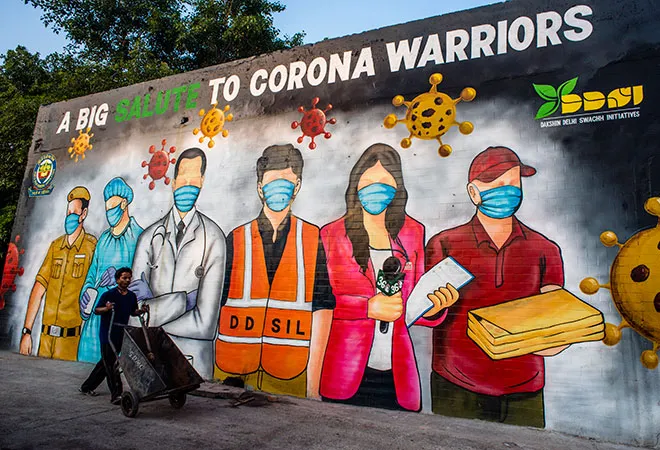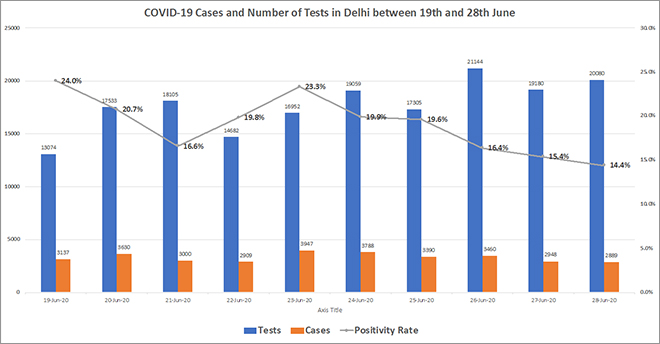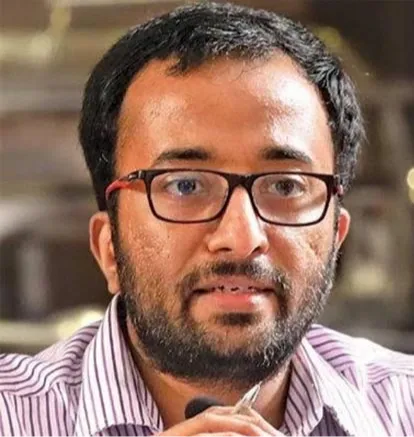
Although aggressive testing wasn’t started early enough to limit the spread substantially, Delhi has had among the highest COVID-19 tests per million persons in the country. In the past 10 days, Delhi has reported more than 3,000 new cases in seven, partly a result of ramping up of testing. However, even with increased testing, the test positivity rates for the city have remained exceedingly high (graph 1), although the rate is beginning to fall significantly in the past week. According to official data, more than half the beds earmarked for COVID-19 patients still remain vacant — 7,413 of a total of 13,390. However, in reference to availability of ICU beds the gap narrows. There are 293 vacant beds out of 893 in ICUs and only 158 out of 747 ICU beds with ventilators are vacant.
 Data available till 28 June. Source: ORF Covid-19 Tracker
Data available till 28 June. Source: ORF Covid-19 Tracker
Earlier in June, Deputy Chief Minister of Delhi, Mr. Manish Sisodia had suggested that based on initial assessments, by 15 July there will be 2.25 lakh cases and 33,000 beds will be needed. He had suggested that by end of July, Delhi was likely to have 5.5 lakh cases and 80,000 beds will be needed. In response, Delhi even considered reserving state government hospitals in the capital exclusively for Delhi residents. With the case numbers going up sharply, it is expected that the need for beds, particularly ICU beds, will go up in the coming weeks. It is in this context that the Central government, Delhi government and MCD have come together to ramp-up the healthcare delivery capacity for COVID-19 infection control. In an interview on 27 June, the Home Minister Mr. Amit Shah gave a comprehensive overview of these initiatives.
With the case numbers going up sharply, it is expected that the need for beds, particularly ICU beds, will go up in the coming weeks.
Monitoring of the Delhi situation is done by a coordination team of the Union government, Delhi government and MCD, and it was decided that by 30 June, every household within around 400 containment zones of the city will be surveyed, and anyone who is symptomatic will be tested. Another similar survey, of every household in Delhi will be completed by 21 July, which is expected to control any silent spread in the city. The plan is to shift milder cases into isolation, so that further transmission is curtailed. To operationalise these plans, in addition to regular employees, a large volunteer network of 5,000 members of youth organisations like NCC, NSS and Scouts/Guides is being leveraged by the coordination team.
According to Mr. Shah, around 500 oxygen cylinders, 10,000 oximeters and 440 ventilators have been provided to the Delhi government after the coordination meeting, and more will be provided as need arises. In order to augment the ambulance capacity in the city, Delhi administration is working closely with companies like Uber and Ola. Earlier, lack of facilities for cremation of dead bodies had proven to be a major problem within Delhi. However, the coordination team has been able to streamline systems and resolve backlogs. On 28 June, MCD informed the High Court that cremations of both COVID and non-COVID dead are being conducted and bodies are not piling up anymore.
In order to augment the ambulance capacity in the city, Delhi administration is working closely with companies like Uber and Ola.
Many amongst the health workers in Delhi who had retired in the recent years are being invited back into active duty to augment health system capacity. Paramilitary forces are being called in to help with healthcare delivery as well. For example, the largest field COVID-19 hospital in the world with around 10000 beds being built in Delhi with both public and private participation will be run by personnel from the Indo-Tibetan Border Police (ITBP). In addition, Indian Army medical teams are being deployed to support the 16000 extra beds that Indian Railways has built.
This major ramp-up of hospital beds is happening to facilitate a shift away from home isolation to institutional isolation of mild patients as well, based on evidence. An analysis of COVID-19 deaths in Delhi by the coordination team had found that around half the deaths were within three days of hospital admission. This hinted at the possibility of people staying back in home isolation till their situation worsened to an irreversible extent.
Price caps have been put on private hospital charges.
With deployment of rapid tests in the capital, it is decided that those living in smaller houses where effective home isolation is difficult, and those belonging to high risk populations with co-morbidities will be shifted to institutional isolation from now on, so as to ensure timely care. In addition, a survey of hospitals in every ward of Delhi was conducted to identify problems in the everyday operations, and a dedicated tele helpline with experts from All India Institute of Medical Sciences (AIIMS) responding to queries from hospitals is set up.
As on 14 June, 9,937 beds have been earmarked for COVID-19 patients in Delhi and by 30 June there will be 30,000 COVID-19 beds available, thanks to a big expansion of infrastructure. In addition to the ITBP facility with 10,000 beds, the Defence Research and Development Organisation (DRDO) is partnering with Tata Trusts to build an exclusive 1000 bed COVID-hospital in which there will be 250 ICU beds with ventilators. In addition, price caps have been put on private hospital charges. In view of these developments, any fear of lack of access to beds or ventilators in the coming weeks in Delhi may be negated.
With ramped up testing, aggressive contact tracing and more focus on isolation of cases, Delhi expects to manage the pace of the spread better in the coming weeks.
Nightmare scenarios that were anticipated initially have not played out in Delhi, as it managed to keep Case Fatality Rates much lower than many other cities. With ramped-up testing, aggressive contact tracing and more focus on isolation of cases, Delhi expects to manage the pace of the spread better in the coming weeks. Reports indicate that on 27 June, a serological survey began in parts of Delhi covering a sample of 20000 people to determine the true extent of the spread of COVID-19. With an earlier serological survey in Kolkata by the Indian Council of Research revealing that 14.39% of the city’s population had already developed COVID-19 antibodies by May, the results of this new survey are keenly awaited, and will help the city have a more focused medium term plan.
The views expressed above belong to the author(s). ORF research and analyses now available on Telegram! Click here to access our curated content — blogs, longforms and interviews.




 Data available till 28 June. Source:
Data available till 28 June. Source:  PREV
PREV


